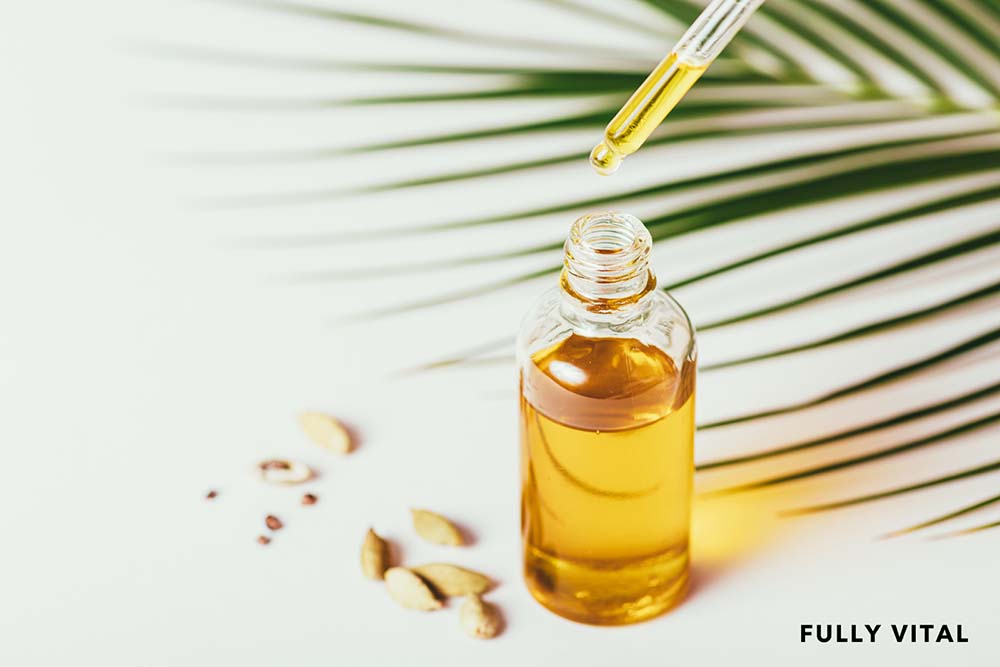
Essential Oils: Stimulate Hair Growth Naturally
Looking for a natural way to stimulate hair growth and achieve beautiful, healthy hair? Enter essential oils.
These concentrated plant extracts have gained popularity among women of all hair types as a natural solution for nourishing hair and promoting growth.
In this guide, we'll explore the benefits, usage, and potential downsides of essential oils.
Plus, we'll address common questions to provide you with a comprehensive understanding of this popular hair care approach.
Get ready to discover the secrets of using essential oils to stimulate hair growth naturally.

I LOVE MY HAIR NOW
FullyVital hair serum and hair vitamins made tremendous improvements in my hair. I truly love my hair now.
Dorit S.,
What Are Essential Oils?
Essential oils are highly concentrated plant extracts that capture the natural aromatic compounds and beneficial properties of various plants.
These oils are derived through processes such as distillation or cold-pressing, preserving the plant's fragrance and therapeutic qualities.

Why Are Essential Oils Important?
Essential oils have gained popularity among women of all hair types as a natural approach to stimulating hair growth.
These oils offer a range of benefits, including promoting scalp health, nourishing hair follicles, and enhancing blood circulation to the scalp.(1)
How Do Essential Oils Work?
Essential oils work through their potent properties, which can vary depending on the specific oil.
They can penetrate the scalp and hair follicles, providing nourishment and promoting hair growth.
Some essential oils possess antifungal and antibacterial properties that help maintain a healthy scalp environment, while others stimulate blood flow, encouraging hair follicles to produce thicker and stronger hair strands.(1)
What Are The Benefits Of Essential Oils?
Promoting Hair Growth
Certain essential oils, like rosemary and peppermint oil, have been found to increase hair growth and thickness.
Reducing Hair Loss
Essential oils such as lavender and cedarwood oil have shown the potential in reducing hair loss and combating thinning hair.
Enhancing Scalp Health
Tea tree oil and eucalyptus oil possess antimicrobial properties that can help prevent scalp infections and soothe irritation.
Strengthening Hair
Essential oils like ylang-ylang and cedarwood oil may improve hair strength, reducing breakage and split ends.
Adding Shine And Luster
Citrus oils such as lemon and orange oil can impart a natural shine to hair, leaving it looking healthy and vibrant.
Are There Any Downsides To Essential Oils?
While essential oils offer numerous benefits, it's essential to exercise caution and consider potential downsides.
Here are a few factors to keep in mind:
Skin Sensitivity
Some individuals may experience skin irritation or allergic reactions to certain essential oils.
It's important to perform a patch test before applying them directly to the scalp or skin.
Proper Dilution
Essential oils are highly concentrated, and using them undiluted can lead to adverse reactions.
Always dilute essential oils with carrier oils before topical application.
Pregnancy And Medical Conditions
Pregnant women, individuals with specific medical conditions, or those taking certain medications should consult a healthcare professional before using essential oils.
What Are The Alternatives To Essential Oils?
While essential oils are a popular choice for promoting hair growth, there are alternative options available:
Herbal Infusions
Infusing herbs like nettle, horsetail, or chamomile into carrier oils can provide similar benefits to essential oils.
Ayurvedic Oils
Ayurvedic hair oils, enriched with herbs and natural ingredients, are another alternative to essential oils for stimulating hair growth.
Vitamins And Supplements
Nutritional supplements containing vitamins, minerals, and specific nutrients can support hair health and growth.
How Have Researchers Studied Essential Oils?
While essential oils have been used for centuries, researchers have increasingly focused on studying their properties and potential benefits.
Numerous scientific studies have explored the efficacy of essential oils for various purposes, including hair growth stimulation.
These studies have shed light on the specific properties of different essential oils and their effects on hair health. While more research is still needed, the existing studies provide promising evidence for the use of essential oils in promoting hair growth.(1)
What Should You Consider When Purchasing Essential Oils?
When purchasing essential oils, it's important to consider the following factors to ensure you're getting a high-quality product:
Purity
Look for essential oils that are 100% pure and free from additives or synthetic fragrances.
Sourcing
Choose oils that are sourced from reputable suppliers who practice sustainable farming and ethical extraction methods.
Certifications
Check if the essential oils have been tested and certified by reputable organizations such as the International Organization for Standardization (ISO) or the National Association for Holistic Aromatherapy (NAHA).
Reputation
Research and select brands that have a positive reputation for producing high-quality essential oils.
Packaging
Opt for essential oils that are packaged in dark glass bottles to protect them from light and ensure longevity.
Price
While price shouldn't be the sole determinant, be wary of extremely low-priced oils, as they may indicate poor quality or dilution.
How Often Should You Apply Essential Oils?
The frequency of applying essential oils depends on various factors, including your hair's condition and sensitivity.
As a general guideline, consider the following recommendations:
For Scalp Massage
Dilute the essential oil with a carrier oil and gently massage it into your scalp 2-3 times a week.
In Shampoo Or Conditioner
Add a few drops of essential oil to your shampoo or conditioner and use them regularly as part of your hair care routine.
As A Hair Mask
Incorporate essential oils into a homemade hair mask and apply it once a week or as needed.
Which Essential Oils Are Commonly Used?
Several essential oils have gained popularity for their hair growth-stimulating properties.
Here are some commonly used essential oils and their benefits:
Rosemary Oil
- Stimulates hair follicles and promotes hair growth.
- Helps combat dandruff and dry scalp.
Peppermint Oil
- Improves blood circulation to the scalp, promoting hair growth.
- Provides a cooling sensation and helps soothe an itchy scalp.
Lavender Oil
- Calms the scalp and promotes relaxation, which can indirectly support healthy hair growth.
- Helps reduce scalp inflammation and nourishes the hair follicles.
Tea Tree Oil
- Possesses antimicrobial properties, helping maintain a healthy scalp environment.
- May assist in treating dandruff and scalp infections.
Cedarwood Oil
- Promotes circulation and stimulates the hair follicles.
- May help slow down hair loss and promote thicker hair growth.
Can Essential Oils Be Used For Specific Purposes?
Absolutely! Essential oils offer a wide range of benefits beyond hair growth stimulation.
Here are some common specific purposes they can be used for:
Relaxation And Stress Relief
Essential oils like lavender, chamomile, and ylang-ylang can help promote relaxation and reduce stress when used in aromatherapy or applied topically.
Scalp Conditions
Tea tree oil and eucalyptus oil possess antifungal and antibacterial properties that can be effective in managing scalp conditions like dandruff or psoriasis.
Hair Conditioning
Oils like argan, coconut, and jojoba can be used as carrier oils to condition and moisturize the hair, leaving it soft and manageable.
Hair Fragrance
Essential oils such as citrus oils, floral oils, or herbal oils can be added to hair products or homemade sprays to impart a pleasant fragrance to your locks.
What Is The History Of Essential Oils?
The use of essential oils dates back thousands of years and spans various cultures around the world.
Here are some key points about the history of essential oils:
-
Ancient Civilizations: Essential oils were used by ancient civilizations, including the Egyptians, Greeks, and Romans, for their therapeutic and medicinal properties.
-
Traditional Medicine: Traditional healing practices, such as Ayurveda and Traditional Chinese Medicine (TCM), incorporated essential oils for their healing and aromatic benefits.
- Herbalism and Perfumery: Essential oils played a significant role in herbal medicine and perfumery, with distillation techniques evolving over time.
Unlock the Potential of Your Hair with Fully VitalExperience the transformational power of our science-backed hair growth products. At Fully Vital, we're dedicated to helping you slow down and reverse the aging of your hair, so you can nurture a healthier and more vibrant relationship with your locks. Our products offer:
Unleash the full potential of your hair and embark on a transformative journey with Fully Vital. Let us be your partner in achieving your hair goals. |
Final Thoughts On Essential Oils
Essential oils offer a natural and effective solution for stimulating hair growth and maintaining healthy locks.
With their potent properties and numerous benefits, essential oils have become a go-to choice for women of all hair types seeking to nourish their hair and promote optimal growth.
From promoting scalp health to reducing hair loss and enhancing hair strength, these plant-based extracts have a lot to offer.
At Fully Vital, we understand the importance of a healthy relationship with your locks.
That's why we offer a variety of hair growth products specifically designed to combat the aging of your hair and promote its vitality.
Discover the power of essential oils and incorporate them into your hair care routine to unlock the full potential of your tresses.
Remember to choose high-quality essential oils, consider safety guidelines, and experiment with different oils to find the ones that work best for your hair.
Embrace the natural benefits of essential oils and enjoy the journey towards healthier, more beautiful hair.
Take the first step towards healthier hair today and start nurturing your locks with the power of essential oils.
Frequently Asked Questions About Essential Oils
How often should I use essential oils for hair growth?
The frequency of use depends on personal preference and hair condition. It's generally recommended to use essential oils 2-3 times per week for optimal results.
Can essential oils cure baldness?
Essential oils cannot cure baldness caused by genetic factors.
However, they can help improve the overall health and condition of the hair, potentially slowing down hair loss and promoting healthier growth.
Are essential oils suitable for all hair types?
Yes, essential oils can be beneficial for all hair types, including straight, wavy, curly, and coily hair.
However, individual reactions and preferences may vary.
Can I mix different essential oils together?
Yes, you can create custom blends by combining different essential oils to address specific hair concerns.
However, it's crucial to research the properties and dilution ratios of each oil before mixing them.
Can essential oils replace medical treatments for hair loss?
Essential oils are not intended to replace medical treatments for hair loss.
If you have significant hair loss concerns, it's recommended to consult with a healthcare professional or dermatologist for an accurate diagnosis and appropriate treatment options.
Can You Use Essential Oils as Perfume?
Yes, essential oils can be used as a natural alternative to synthetic perfumes.
Their aromatic properties make them ideal for creating personalized scents. To use essential oils as perfume:
- Dilute a few drops of your preferred essential oil with a carrier oil, such as jojoba or sweet almond oil.
- Apply the diluted mixture to pulse points, such as wrists, neck, or behind the ears.
- Experiment with different essential oil combinations to create your signature scent.
Do Essential Oils Expire?
Yes, essential oils do have a shelf life and can expire over time.
While the exact expiration date can vary depending on the oil and its storage conditions, most essential oils can last for around 1 to 3 years.
Factors that can affect their shelf life include:
- Exposure to heat, light, and air can accelerate deterioration.
- Citrus oils, such as lemon or orange oil, tend to have a shorter shelf life.
- Proper storage in dark glass bottles, away from direct sunlight and extreme temperatures, can help prolong their potency.
Should You Refrigerate Essential Oils?
Refrigeration is generally not necessary for essential oils.
In fact, it can cause condensation inside the bottle, which may impact their quality.
It's best to store essential oils in a cool, dry place, away from sunlight and heat sources.
Ensure the bottles are tightly closed to prevent air exposure and maintain their integrity.
Can Essential Oils Be Used in DIY Recipes and Home Remedies?
Absolutely! Essential oils are versatile and can be used in a variety of DIY recipes and home remedies. Here are a few examples:
-
Skincare: Add essential oils to homemade face masks, serums, or body lotions for their beneficial properties.
-
Hair Care: Enhance your hair care routine by incorporating essential oils into homemade shampoos, conditioners, or hair masks.
-
Aromatherapy: Use essential oils in diffusers or as room sprays to create a relaxing and aromatic atmosphere.
- Cleaning Products: Add essential oils to natural cleaning solutions for their pleasant scent and antimicrobial properties.
How to Store and Prolong the Shelf Life of Essential Oils?
Proper storage is essential to preserve the quality and extend the shelf life of essential oils. Consider the following tips:
-
Dark Glass Bottles: Store essential oils in dark glass bottles to protect them from light exposure, as UV rays can degrade their potency.
-
Cool and Dry Environment: Keep essential oils in a cool, dry place, away from direct sunlight and heat sources.
-
Tightly Closed Containers: Ensure the bottles are tightly closed after each use to prevent air exposure, which can cause oxidation.
-
Avoid Contamination: Use clean droppers or pipettes when handling essential oils to avoid cross-contamination.
- Labeling: Properly label each bottle with the name of the essential oil and the date of purchase to keep track of their shelf life.
Sources
- Essential Oils for Your Hair: What to Know. (n.d.). WebMD. https://www.webmd.com/beauty/natural-oils
- Chouhan, S., Sharma, K., & Guleria, S. (2017). Antimicrobial Activity of Some Essential Oils—Present Status and Future Perspectives. Medicines, 4(3), 58. https://doi.org/10.3390/medicines4030058
- Ali, B., Al-Wabel, N. A., Shams, S., Ahamad, A., Khan, S. A., & Anwar, F. (2015). Essential oils used in aromatherapy: A systemic review. Asian Pacific Journal of Tropical Biomedicine, 5(8), 601–611. https://doi.org/10.1016/j.apjtb.2015.05.007







